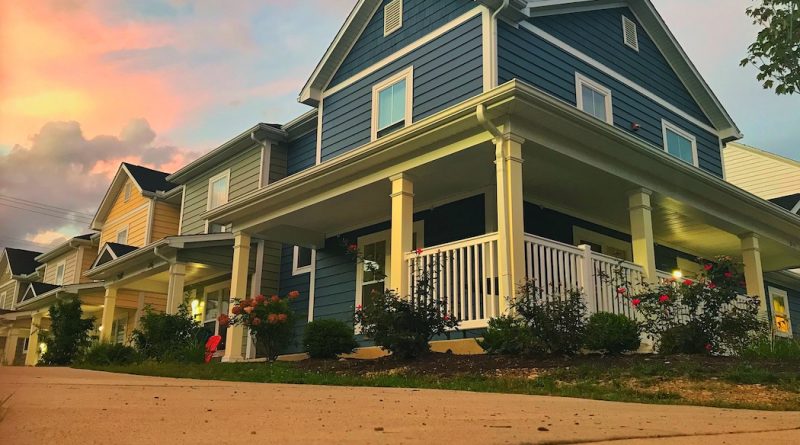Letter to the Editor: Senior Human Rights Studies Students Discuss What Community Requires in Light of Bias-Incidents
Students who objected to alumni calling the student neighborhood (cover photo) “the ghetto” on social media were then told they didn’t belong on campus. Courtesy of Sean Newhouse
This year, we 17 students are graduating with degrees in Human Rights Studies. This is the largest graduating class in the major since its beginning 21 years ago. Our studies have taken us around the globe to places like Malawi, Guatemala, Mexico, and Ireland. They have taken us around the country to places like Standing Rock, El Paso, New York, Detroit, and Washington D.C. But too often, we forget what international human rights law can do at the local level.
Throughout our time here, we’ve witnessed the UD community fail and succeed in its commitment to recognize the dignity of all.
From the start of our freshman year, we have received countless emails about racist language written on whiteboards and in the snow. White supremacist posters have been posted around campus. Pride flags continue to be ripped from homes and thrown in garbage cans.
On Instagram, alumni told students of color who were protesting the use of the word ghetto to describe the student neighborhood that they did not belong on our campus or in our community. These acts of hatred have challenged the core and mission of UD. In the face of these abuses, it is on all of us to decide what we want community to mean.
Communities are reflexive and responsive.
While we often talk about human rights abuses as cruelties that happen far away in international contexts, it’s most important to understand what human rights look like within the context of a community. Though the notion of human rights stems from a recognition of universal human dignity, individuals only enjoy those rights when others recognize what each person is due and commit to making sure that individuals are given what they need to make that possible.
Like community, human rights only exist when we commit to being in fair and loving relationships with each other. And, when our actions hurt each other, being in community requires us to be willing to change our behaviors.
When students have challenged the use of the word “ghetto” for the student neighborhood, both alumni and some current UD students have argued that the use of the word “ghetto” is a tradition. But, while traditions are important, we cannot talk about traditions without talking about larger historical context.
According to Daniel Schwartz in Time Magazine, the word “ghetto” was first used in the early 16th century in Venice when Christians wanted the city to be Christian only and confined the Jewish population to a small island. Later, “ghetto” was revived by the Nazis to describe the quarters that Jewish people were relocated to. In the 1960s, “ghetto” referred to racially segregated areas created by redlining.
Because of its own history of redlining, in 2017 the city of Dayton was ranked the 15th most segregated city in the country. While 69% of UD students come from the top 20% of income earners, 32% of black Dayton residents live in poverty. When students and alumni choose to ignore the history of the word ghetto because of “tradition,” we ignore the histories of oppressed communities. In short, we incorporate the legacies of segregation and poverty, disguising them as quirky aspects of a drinking culture for privileged UD students.
As a predominantly white institution, these injustices are part of the legacy of racial inequality which has been long intertwined with our own. We cannot be in community with one another unless we are willing to give up the privileges that keep us apart.
In order to protect our campus community and to work towards the goals of the institution, it is imperative that we determine which traditions are beneficial and which traditions are harmful. Until we work to change those places where hate and intolerance exist at an institutional level, responding to isolated moments of overt racism will function only as a band-aid trying to cover a much larger wound.
We must be introspective and consider when our traditions are only self-serving. We must consider the history of our institution and the community it is situated within. We must understand and repair those parts of our legacy which we deem intolerable.
Being in community requires courage.
It is not enough to emphasize the value of community without enacting the change necessary to uphold it. Words and emails are not enough. One of the most important lessons that human rights has taught us is that justice requires structural change.
Inclusion doesn’t just mean making space within an existing structure, but changing the structures we have. We cannot create spaces where all feel welcomed if parts of our institution function to marginalize those who are most vulnerable.
Now is the time to be an upstander, not a bystander.
We demand direct accountability for individual instances of hate crimes and other forms of injustice. We demand that our community recognizes our mistakes and follows through with actions that propel us forward, rather than just responding by saying “we can do better.”
When the same racist and homophobic incidents keep happening on this campus, we must assemble as a community to think critically and consider what it is about our community’s structure that makes prejudice possible.
Signed,
Alex Curtin
Maggie Cadman
Anna Delaney
Grace Evans
Tiffany Hendricks
Bailey Johnson
Julianne Kalec
Rebecca LeBouef
Zach Lemaster
Michaela Linehan
Elyse McMahon
Mary McLoughlin
Josh Segalewitz
Ryan Scott
Landis Soto
Tess Sweeney
Destiny Watson

